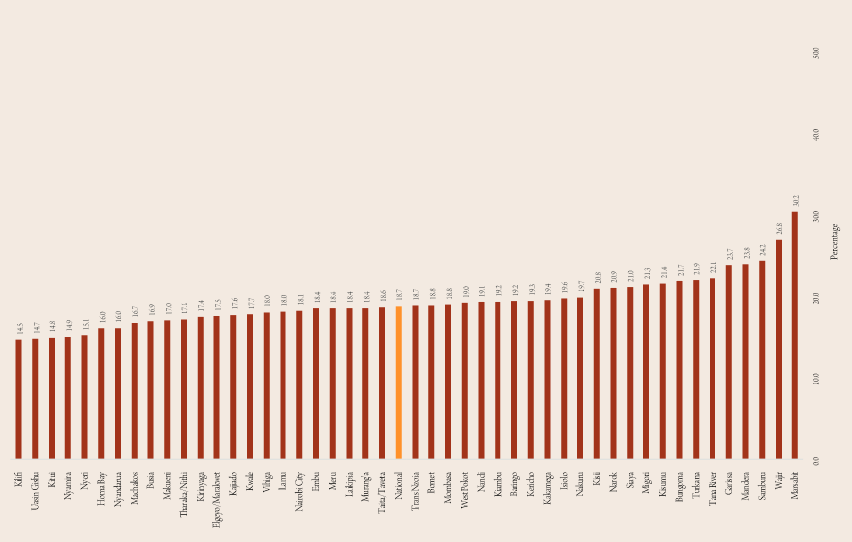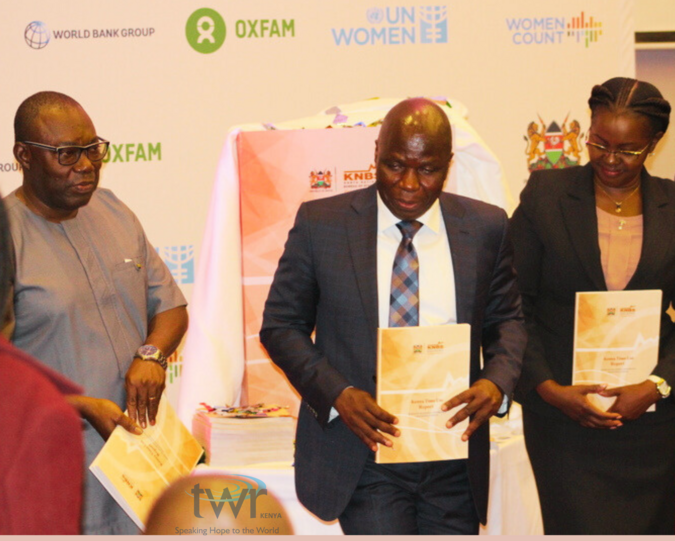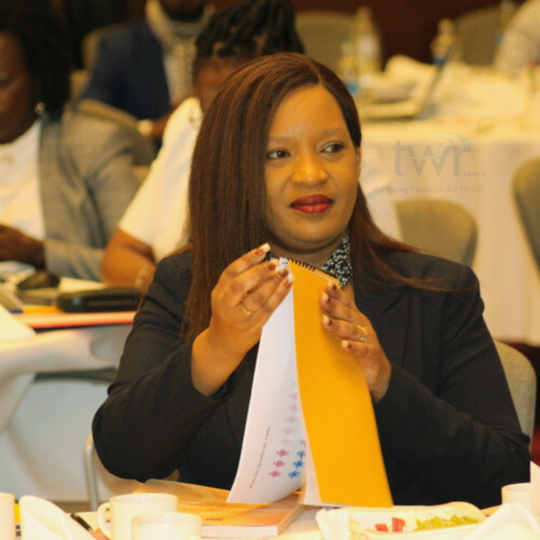By Geoffrey Otieno

Latest first ever statistics from the Kenya National Bureau of Statistics (KNBS) through a joint initiative on Time Use Survey Report indicate that nationally, women spend approximately five times as much time as men on unpaid domestic and care work, a situation which can perpetuate gender inequalities and hinder women’s empowerment. Yet, this contribution is not properly accounted for in the national economy.
According to the report released on the on the 18 October 2023, Nationally, population age 15 years and above spend about 12.2 per cent of their day (about 3 hours) on unpaid domestic and care work. On average women spend approximately 5 hours per day on unpaid work, which is about five times more than men (about 1 hour). The proportion of time spent on these activities in rural areas is slightly higher compared to urban areas for both women and men.

Nationally, women spend approximately 7 times more time on unpaid care work (2.4 %) than men (0.4%) and about 5 times more (16.3%) on unpaid domestic work than their male counterparts (3.2%).
The disproportionate burden of unpaid care and domestic work on women can significantly limit their ability to engage in productive activities or participate in public life and even contribute to the feminization of poverty,” said Anna Mutavati, UN Women Country Representative and Acting Deputy Regional Director for East and Southern Africa in a speech read on her behalf by Joshua Musili UN Women Kenya representative at the report launch in a city hotel
There are gender differentials on how time is spent on unpaid care work and domestic work at county level. The burden of unpaid work is highest for women in Marsabit county at 30.2% (approximately 7 hours) followed by counties Wajir at 26.8% Samburu at 24.2%, Mandera at 23.8% and Garissa at 23.7% . Top three counties that recorded the lowest proportions of time spent on this work were Kilifi at 14.5%, Uasin Gishu 14.7%, and Kitui at 14.8 %. While other counties like Turkana ranked at position 41 out of the 47 counties at 21.9%, Taita Taveta ranked 23 at 18.6% and Lamu ranking at 17 at 18.0 % that was followed by Nairobi at 18.1 %.
On the other hand Men in Turkana County spend nearly five hours per day on unpaid domestic services for household and family members−the highest amount of time for men nationally and a sharp contrast with Isiolo County, where the study indicates that men spend just over 1.5 hours on unpaid care and domestic work, the least amount of time spent by men nationally.
“The new data is important for accurately measuring the household production of goods and services and their contribution to the national economy,” said Sebastian Tiah, Country Director, Oxfam in Kenya.
“Without time use data, gross domestic product, the current measure of economic activity, is in essence incomplete as it excludes the unpaid production of household goods and services, which is mainly done by women,” said Keith Hansen, World Bank Country Director.
“This results in under-reporting women’s contribution to the country’s socioeconomic growth,” she added.

“42% of women globally are outside paid work as they engage in care work in comparison to 6% of men’ said Ms. Betty Sungura, CEO National Gender and Equality Commission
The findings by age group show that women predominantly spent more time on unpaid care and domestic work compared to men across all age groups. Nationally, the proportion of time spent on unpaid work by girls age 15-17 years, is thrice as much (14.0%) as that of boys (4.1%) in the same age group. Among the youth (18-34 years), the proportion of time that women spend on similar activities per day is slightly over a fifth (21.6 %), about 6 times more than young men. Elderly women age 60 years and above spend about three hours (13.0%) on unpaid domestic and care work, while their male counterparts spent about an hour (3.2%) at national level.
Regardless of their work status, women spend more time on unpaid work than men. Nationally, individuals who are not working spend more time on the said activities (16.4%) compared to those who are working (10.5%) on a daily basis. Working women spend on average 4 hours per day on unpaid work, whereas, working men spend about an hour.
“Beyond regular and periodic national surveys to provide much-needed time use data, the report also calls for the development of an unpaid care and domestic work policy to provide a legal framework to recognize, reduce, and redistribute unpaid care work, ”said Macdonald Obudho, Director General, KNBS.
“The development of labour policies to support the integration and transition of unpaid caregivers into the labour force is also needed. This would also help to establish family-friendly working arrangements for all workers, regulate and implement decent terms and conditions of employment, and help achieve equal pay for work of equal value for all care workers. This data will help to recognize and even value unpaid care and domestic work in economic terms,” said State Department for Economic Planning Principal Secretary James Muhati.
“Providing public services, infrastructure, and social protection and promoting shared household responsibility in the local context will go a long way in empowering women and girls for the benefit of all,” said Anne Wang’ombe, Principal Secretary, State Department for Gender and Affirmative Action.
The survey report was joint initiative of the Kenya National Bureau of Statistics in partnership with the State Department for Gender and Affirmative Action, UN Women, the World Bank, and Oxfam International. The National Gender and Equality Commission, the Council of Governors, and the University of Nairobi were other instrumental partners.
The the Kenya Time Use Survey Report is based on the 2021 Kenya Continuous Household survey targeted population age 15 years and above drawn from all the 47 counties. The sample size for the 2021 KTUS was 24,000 households sampled from 1,500 Enumeration Areas drawn from the Kenya Household Master Sample Frame (K-HMSF) that had been developed from the 2019 Kenya Population and Housing Census.
Findings from the Kenya Time Use Survey Report resonate with statistics from the International Labour Organization (ILO), which indicate that three-quarters of all unpaid care work globally is undertaken by women and girls. These and other interventions will help free up women to engage more in paid productive activities and subsequently assist in poverty reduction and boosting Kenya’s socio-economic growth.

